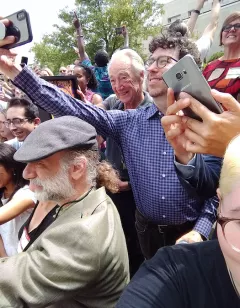
Platforms, Politics, and Power
Understanding and Shaping the Internet in 2018
Download original audio or video from this event.
Subscribe to the Berkman Klein events series podcast.
Berkman Klein co-founder Jonathan Zittrain illustrates contributions of Center to internet and society research and dialogue
Drawing from memes, magazine covers and legal documents from the past 60 years, Jonathan Zittrain gave a lively overview of the internet since its inception, spanning the debates, concerns, and hopes in the years since, and how the Berkman Klein Center fits into—and contributes to—these conversations.
The Berkman Klein Center tackles a wide range of topics related to the internet and emerging technologies from multidisciplinary perspectives. Throughout her talk Zittrain, co-founder of the Berkman Klein Center and faculty at Harvard Law School, flagged cybersecurity, artificial intelligence, and media information quality issues as examples of topics addressed by the Center. Privacy and security concerns also continue to orbit the internet and platforms built upon it, he said.
“Our own reaction to this kind of stuff as a Center has not just been to pump the bellows of a vague sense of unease into escalating panic (although there are times when that is called for), but rather to sit back, be analytic, talk to the people, to the companies, to the governments involved, and try to get a handle on what is going on,” Zittrain said.
In addition to working with policymakers, businesses, academics and other stakeholders to think through and advise on Internet issues, the Berkman Klein Center also works to build a better internet.
“As part of our credo, we want to build on the Internet as much as study it and write papers about it, or talk to policymakers about it,” Zittrain said.
He highlighted Creative Commons, a license for authors to share their work without copyright or paywall barriers, which Berkman Klein incubated in response to questions about copyright infringement in the early 2000s. Creative Commons is “an example of a really interesting organization that started as an idea on this campus and has taken on a life of its own,” Zittrain said.
A central facet to Berkman Klein is asking difficult questions and bringing together people with divergent perspectives and experiences to discuss emerging technologies through the lenses of law, social science, computer science, business, and ethics, among others. For example, as developers, both amateur and professional, create new tools and platforms, Zittrain asked whether developers should consider the ethical and societal consequences of the technology.
“Should [developers] be thinking now about the implications of it, rather than just ‘hey we’ll build it, we’ll make it popular’?” Zittrain asked. “These are the kinds of questions that have all of us —and across the campus through an effort we’re calling Techtopia—has us thinking about ethics in a way we did not before.”
Techtopia, a program bringing together students and faculty from across Harvard programs and schools to confer and learn relevant skills for working with and building digital technology, is but one example of Berkman Klein fostering interdisciplinary dialogues.
“This is the common thread among [Berkman Klein Center projects]: people coming together in the public interest to understand better what’s happening, to ask what impact it’s having on the world and on people, to make moral judgement and debate about whether this is fine or not. And if it isn’t, or if it isn’t as fine as it can be, what to do about it, and how?” Zittrain said. “That’s what we stand for, and it’s something that we desperately need company in it because otherwise we stand parochially and that’s not what we want to do.”
This talk was part of the Berkman Klein Center Luncheon Series, a weekly forum for conversations about Internet issues and research. It is free and open to the public.
About Berkman Klein
We bring together the sharpest, most thoughtful people from around the globe to tackle the biggest challenges presented by the Internet. As an interdisciplinary, University-wide center with a global scope, we have an unparalleled track record of leveraging exceptional academic rigor to produce real- world impact. We pride ourselves on pushing the edges of scholarly research, building tools and platforms that break new ground, and fostering active networks across diverse communities. United by our commitment to the public interest, our vibrant, collaborative community of independent thinkers represents a wide range of philosophies and disciplines, making us a unique home for open-minded inquiry, debate, and experimentation.
Photo courtesy of Griffin Boyce.
You might also like
- community‘Facts can’t fix this’
- communitySEO for AI
